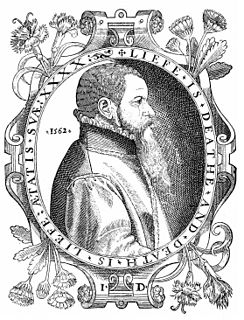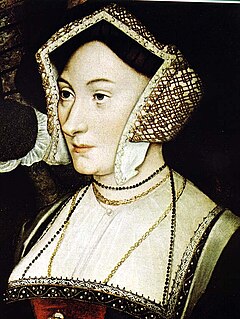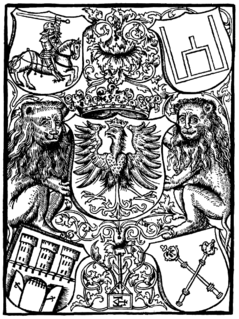
Thomas Linacre or Lynaker was an English humanist scholar and physician, after whom Linacre College, Oxford, and Linacre House, a boys' boarding house at The King's School, Canterbury, are named.
This article presents lists of literary events and publications in the 16th century.

Sir Thomas Elyot was an English diplomat and scholar. He is best known as one of the first proponents of the use of the English language for literary purposes.
Polydore Vergil or Virgil, widely known as Polydore Vergil of Urbino, was an Italian humanist scholar, historian, priest and diplomat, who spent much of his life in England. He is particularly remembered for his works the Proverbiorum libellus (1498), a collection of Latin proverbs; De inventoribus rerum (1499), a history of discoveries and origins; and the Anglica Historia, an influential history of England. He has been dubbed the "Father of English History".

John Day was an English Protestant printer. He specialised in printing and distributing Protestant literature and pamphlets, and produced many small-format religious books, such as ABCs, sermons, and translations of psalms. He found fame, however, as the publisher of John Foxe's Actes and Monuments, also known as the Book of Martyrs, the largest and most technologically accomplished book printed in sixteenth-century England.
Robert Crowley, was a stationer, poet, polemicist and Protestant clergyman among Marian exiles at Frankfurt. He seems to have been a Henrician Evangelical in favour of a more reformed Protestantism than the king and the Church of England sanctioned. Under Edward VI, he joined a London network of evangelical stationers to argue for reforms, sharing a vision of his contemporaries Hugh Latimer, Thomas Lever, Thomas Beccon and others of England as a reformed Christian commonwealth. He attacked as inhibiting reform what he saw as corruption and uncharitable self-interest among the clergy and wealthy. Meanwhile, Crowley took part in making the first printed editions of Piers Plowman, the first translation of the Gospels into Welsh, and the first complete metrical psalter in English, which was also the first to include harmonised music. Towards the end of Edward's reign and later, Crowley criticised the Edwardian Reformation as compromised and saw the dissolution of the monasteries as replacing one form of corruption by another. On his return to England after the reign of Mary I, Crowley revised his chronicle to represent the Edwardian Reformation as a failure, due to figures like Thomas Seymour, 1st Baron Seymour of Sudeley, Edward Seymour, 1st Duke of Somerset and John Dudley, 1st Duke of Northumberland. Crowley's account of the Marian martyrs represented them as a cost mostly paid by commoners. The work became a source for John Foxe's account of the period in his Actes and Monuments. Crowley held church positions in the early to mid-1560s and sought change from the pulpit and within the church hierarchy. Against the Elizabethan Religious Settlement, Crowley was a leader in the renewed vestments controversy, which eventually lost him his clerical posts. During the dispute he and other London clergy produced a "first Puritan manifesto". Late in life Crowley was restored to several church posts and appears to have charted a more moderate course in defending it from Roman Catholicism and from nonconformist factions that espoused a Presbyterian church polity.

Margaret Roper (1505–1544) was an English writer and translator. Roper, the eldest daughter of Sir Thomas More, is considered to have been one of the most learned women in sixteenth-century England. She is celebrated for her filial piety and scholarly accomplishments. Roper's most known publication is a Latin-to-English translation of Erasmus' Precatio Dominica as A Devout Treatise upon the Paternoster. In addition, she wrote many Latin epistles and English letters, as well as an original treatise entitled The Four Last Things. She also translated the Ecclesiastical History of Eusebius from the Greek into the Latin language.
Richard Tottel was an English publisher and influential member of the legal community. He ran his business from a shop located at Temple Bar on Fleet Street in London. The majority of his printing was centered on legal documents, but he is most known for a collection he edited and published in 1557 called Songes and Sonnettes.

Johann Faber was a Catholic theologian known for his writings opposing the Protestant Reformation and the growing Anabaptist movement.

Richard Pynson was one of the first printers of English books. Born in Normandy, he moved to London, where he became one of the leading printers of the generation following William Caxton. His books were printed to a high standard of craftsmanship, and his Morton Missal (1500) is regarded as among the finest books printed in England in the period.

Dirk Martens was a printer and editor in the County of Flanders. He published over fifty books by Erasmus and the very first edition of Thomas More's Utopia. He was the first to print Greek and Hebrew characters in the Netherlands. In 1856 a statue of Martens was erected on the main square of the town of his birth, Aalst.
Events from the 1520s in England.

Hieronymus Vietor was a printer and publisher born in Silesia and active in Vienna and Kraków. Famous for the quality and quantity of his prints, he is considered one of the most important early book printers in Poland, also because he was the first to regularly print in Polish. He is also known as Hieronymus Philovallensis or Hieronymus Doliarius, or in Polish as Hieronim Wietor or Büttner.
Leonard Cox was an English humanist, author of the first book in English on rhetoric. He was a scholar of international reputation who found patronage in Poland, and was friend of Erasmus and Melanchthon. He was known to contemporaries as a grammarian, rhetorician, poet, and preacher, and was skilled in the modern as well as the classical languages.

Edward Whitchurch was a London printer and publisher of Protestant works.
John Siberch was the first Cambridge printer and an associate of Erasmus.

Richard Sherry was an English schoolteacher and author.
The St Albans Press was the third printing press set up in England, in 1479. It was situated in the Abbey Gateway, St Albans, a part of the Benedictine Monastery of St Albans. The name of the printer is unknown, only referred to by Wynkyn de Worde in a reprinting of one of the St Albans books as 'Sometime schoolmaster'. He has sometimes been identified as John Marchall, master of St Albans School; however, a passage written by Worde in 1497 implies that the printer was deceased, and Marchall is known to have lived until 1501. Recent research has produced the name John Haule as a possible candidate for the Schoolmaster Printer. He presented the school with its first printed textbook, the Elegantiolae, which was the first book printed at the press, and he was a printer, probably in St Albans in 1479.
Thomas Swinnerton was an evangelical preacher and author during the English Reformation.

Michiel Hillen van Hoochstraten or Michel Hillenius, was a Flemish printer, publisher, bookseller and bookbinder. His printing press put out publications in a wide range of genres, including imperial ordinances, almanacs, devotional literature, anthologies of customs, textbooks, etc. He also printed humanistic writings by Erasmus, Adrianus Barlandus and Jacobus Latomus as well as the first Dutch-language version of the story of Till Eulenspiegel. His multiple editions of the Bible in Dutch translation were among the first to be published. Michiel Hillen van Hoochstraten is regarded as the most important publisher active in Antwerp in the first half of the sixteenth century.












